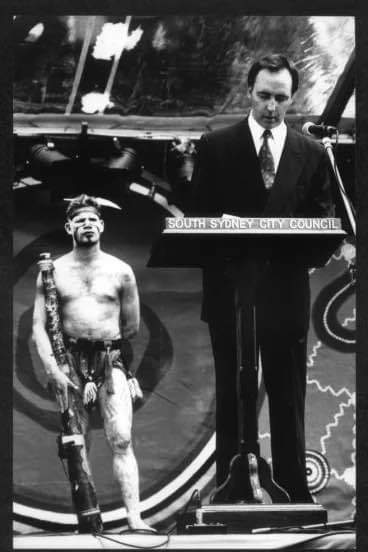Australia has a devastatingly violent and deadly history when it comes to the treatment of our Aboriginal and Torres Strait Islander people. Since 1788 Aboriginal and Torres Strait Islander people have been subject to incomprehensible atrocities, and have had their culture and their way of life almost eliminated. From the bloody onslaught at the time of British invasion right through to the inequality that continues to permeate society, First Nations people continue to be let down by our governments. Reconciliation Week 2021 offers an opportunity to pause and consider this harrowing past. In the past few decades there have been major historical milestones in Australia's journey to reconciliation. The 1967 Referendum saw 90.77 per cent of Australians vote "yes" when asked whether the Australian Government should be able to legislate on behalf of First Nations people and whether they should be included in the census. The historic Mabo decision that ruled that Australian land was not terra nullius at the time of colonisation led to the establishment of the Native Title Act in 1993.
In 2008 the then Prime Minister Kevin Rudd gave the Apology speech. Despite these advancements, Indigenous Australians continue to be over-represented in statistics of incarceration, health issues, low education and a plethora of other categories. This year, in 2021, the theme of reconciliation week is "More than a word. Reconciliation takes action." So what does active reconciliation look like? Karen Mundine, the CEO of Reconciliation Australia, stated:
Reconciliation isn't a single moment or place in time. It's lots of small, consistent steps, some big strides, and sometimes unfortunate backwards steps ...
This sentiment is reflected in the strategic direction of Reconciliation Australia. It has five pillars of reconciliation: race relations, equality and equity, institutional integrity, unity and, finally, historical acceptance. Each of these pillars aligns with a desired aim and action plan for one day achieving a reconciled nation. At the forefront of all of these is the need to amplify and prioritise First Nations voices in guiding these endeavours.
One way of achieving this is through the establishment of a treaty—a treaty that formalises the expectations of a relationship. Australia is the only Commonwealth nation to not have a treaty with its Indigenous population. It is widely believed that a treaty in Australia would address issues of sovereignty, land rights, shared power, the need for a guaranteed voice in government, recognition, ownership, reform and entitlements. Not only would the establishment of a treaty in Australia have these tangible impacts, which would contribute toward reconciliation; it would also be a symbolic gesture of the intent to change. Bob Hawke is fondly remembered by Aboriginal and Torres Strait Islander people for his attempts to establish a treaty, which were ultimately hindered by resistance. Nevertheless, theBarunga Statement served as an important reminder that there was the potential for change in the appropriate political landscape.
More recently, in 2017, theUluru Statement from the Heart saw Aboriginal and Torres Strait Islander people from across Australia come together in a historical moment of unification. The statement was a powerful call to action from the First Nations people to the Australian Government and population. The concluding statement in the document is:
In 1967 we were counted, in 2017 we seek to be heard. We leave base camp and start our trek across this vast country. We invite you to walk with us in a movement of the Australian people for a better future.
The main objective of the statement was to enact constitutional change that enshrined First Nations voices into Parliament. This action would ensure that First Nations people were involved in policymaking decisions that affected them. What theUluru Statement from the Heart highlighted was that the journey of reconciliation would be impossible if the voices of Australia's First Nations people are not included. To achieve a reconciled Australia, Aboriginal and Torres Strait Islander people will need to be given the platform, opportunity and legitimacy to guide and advise conversations about their experiences in this nation. The Victorian Government has paved the way through the recent adoption of the Advancing the Treaty Process with Aboriginal Victorians Bill 2018. It established the necessary framework for beginning the treaty-making process. If Victoria, South Australia and Northern Territory can start the process, why can't we?





















0 comments:
Post a Comment